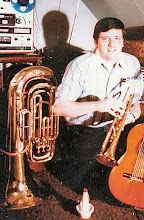


Side A:
1. Panama
2. If I Could Be With You
3. I Can't Give You Anything But Love
4. Bye and Bye
Side B:
1. Sunday
2. Melancholy Rhapsody
3. Lil' Liza Jane
4. Hindustan
Liner Notes:
Personnel:
George Girard trumpet
Joe Rotis trombone
Pete Fountain clarinet
Roy Zimmerman piano
Bunny Franks bass
Charlie Duke drums
Recording Dates New Orleans August and November 1950, Chicago September 19, 1951, Record released March 1952
From 1950-1954, Pete led The Basin Street Six, a band that also featured legendary trumpet player/vocalist George Girard, along with Joe Rotis on trombone, Roy Zimmerman on piano, Buddy Franks on bass and Charlie Duke on drums.
Dixieland in 1950 was no longer popular and the Basin Street Six was created as the greatest unemployed band in the City. It was George Girard who came up with a regular two nights a week job at L'Enfants on Canal Boulevard. The band had to play dance music mostly. Bill Reed of WWL TV picked up the show as part of his dixieland revival campaign and within three months the Basin Street Six had found their niche as a funny hat band, wearing old Mardi Gras costumes, switching instruments and even dressing up as girls on occasions, a real fun band but still playing good dixieland jazz.
In fact the band was good enough to make their first recording session towards the end of the year. The group soon landed a recording contract with the Mercury imprint in 1952. For Mercury they recorded a handful of singles and LPs. Pete Fountain was on his way.
When the TV job closed, L'Enfants returned to having only a dance music policy and late in 1951 the Basin Street Six were again looking for work. Within a week the band opened at Perez's Oasis and then the Silver Slipper Club on Bourbon Street (the same building that housed the Silver Slipper Club became Your Father's Moustache' during the 60's and 70's but now no longer exists as a jazz venue).
Soon they were playing six nights a week all over the City, the dixieland revival was in full swing. A second recording session was made this time for Mercury Records. Down Beat carried a story, the band were now living like celebrities. Blaise D'Antoni, president of the Standard Fruit Company, the largest importer of bananas in New Orleans, bought the band under a ninety-nine year contract, he liked the way they clowned and played. All the members of the band signed the contract, part of the deal being that the Standard Fruit Company continued to call the band the Basin Street Six. The band opened on a banana boat bound for Honduras, a two week cruise entertaining Mr. D'Antoni's guests. Everybody had a good time but it could not last and the ninety-nine year contract ended after three months, with everyone parting friends.
Back in New Orleans the Basin Street Six played the intermission set for a Louis Armstrong concert at the Municipal Auditorium, a fitting accolade for the fine little band. A trip to the Blue Note in Chicago was reluctantly made, none of the men wanted to be away from home for long. There were periods of squabbling and it became obvious that there were feelings of discontent among the fellows, they were falling out over everything. In four years the band had always been run as a cooperative unit, no leader, but this had not always been easy as George Girard was really a natural leader with a super strong personality. Upon returning from Chicago George quit the band to form him own group, Connie Jones replaced him for a while, Roy Zimmerman and Pete Fountain left a few weeks later. It was 1954, the Basin Street Six were no more. George Girard was destined to be one of New Orleans greatest talents, but unfortunately passed away from colon cancer at the young age of 26 two years later. A chapter completes in the continuing story of New Orleans dixieland jazz.



No comments:
Post a Comment